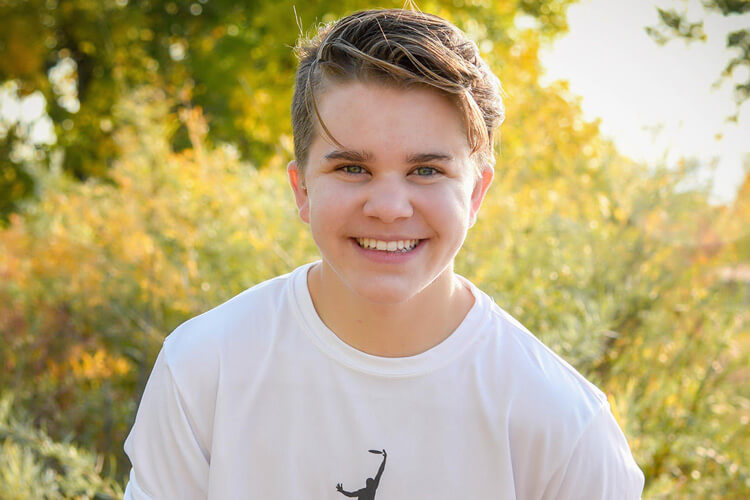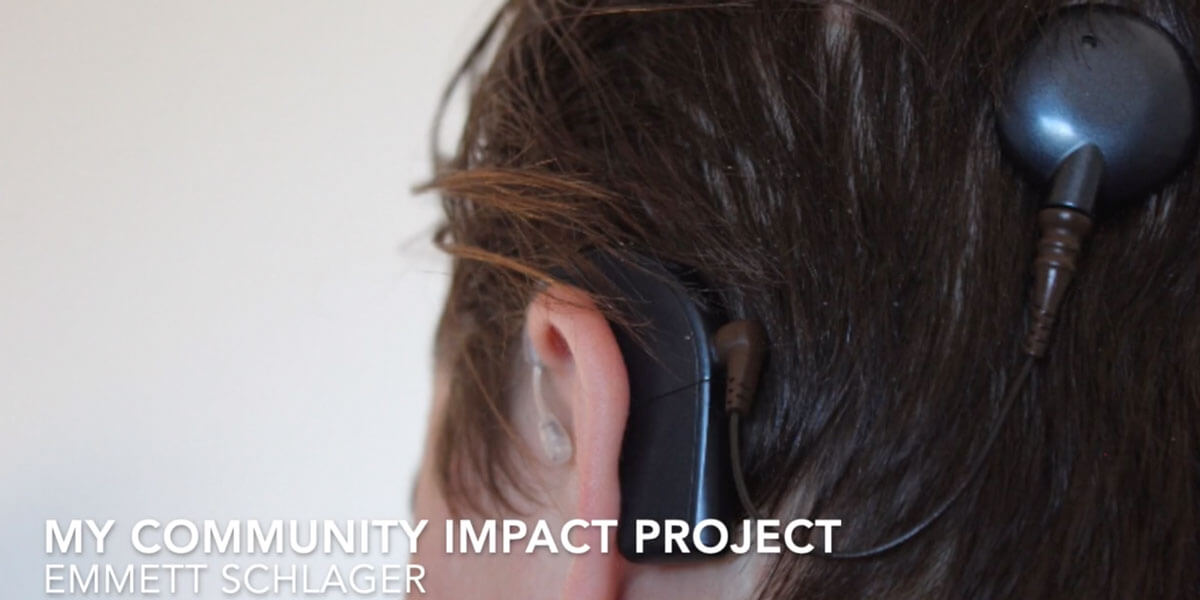
During a year of living with the COVID-19 pandemic, Colorado Academy Senior Emmett Schlager decided to use his Senior Community Impact Project (CIP) as an opportunity to do research and help give back to the deaf and hard of hearing. Schlager was born deaf and received both his cochlear implants at a young age. His CIP video explains the multiple steps he followed—doing research, collecting data, creating a web video about masks for fellow participants in the Cochlear Implant Family Camp, and meeting with other members of the hard-of-hearing community via Zoom to discuss his findings. Ultimately, he and his mother were interviewed by an international cable station about his project. His video and his thoughts, shared in a Q & A format, may provide perspective and insight during the challenging times presented by life in a pandemic.
Would you like to discuss how this project was driven by personal experience?
I went through years of speech therapy and have excelled more than anyone would have thought possible. I speak incredibly well and hear just the same, but with anyone who has a cochlear implant, even after the initial learning stage, we are constantly having to work to hear. This can cause a lot of exhaustion in high stress situations, so when the pandemic hit, and everyone’s mouths were covered by masks, it was clear that I was having a hard time adjusting to the extra work it took just to understand people. I began to realize that this was not only happening to me. I decided that if there were anything I could possibly do to relieve some of these issues for me and others, then I should try.
Why did you think collecting data was important?
Even though I am a part of the hard-of-hearing community myself and could have done the project based on my own experiences, I realized my experience could be very different from someone else’s. I felt that it was important to create the survey and gather data based on others’ experiences, so that I could attempt to create the most relevant solutions to people’s needs.
Was there anything you learned from the data that surprised you?
Yes! One of my questions on the survey asked what people have been trying and doing to overcome hearing issues, and whether or not these strategies helped. It was really fascinating to hear everything that people were trying! After my project, I tried some of the suggestions, so it was really fun to see my work come full circle. I helped them; they helped me!
Among some of these responses were suggestions for very specific captioning apps that work well: using Bluetooth speakers for online school, because the clarity is better; using dish soap to keep clear masks from getting foggy; and even using a self-directed microphone attachment to your phone that allows you to point at whoever or whatever you choose, that will then stream directly to your cochlear implants!
You could have stopped after you collected the data. Why keep going?
There’s no point in collecting data if you don’t do anything about it. It was kind of world- altering to go to a camp every summer that was full of kids like me, and it has given me lifelong memories and friendships. I cannot begin to describe how much that community impacted my life for the better, and my hope was that I would be able to give something back to them.
You ended up making a video talking about masks to help hard-of-hearing people. At this point, were you starting to feel like this was going much further than you expected?
As I was doing research on masks and sending one-on-one recommendations to friends here and there about them, I realized that the more people who know about this, the better! So my mom, Julie Schlager, who is now the director of the Cochlear Implant Family Camp, had a great idea: to make a video reviewing our top five masks and the benefits and drawbacks of each one and post it on the website. After we posted it, I was shocked with how many people were watching it. Within about two weeks, the video had more than 4,000 views.
What did you learn about yourself by doing this project?
I learned that I (and everyone else) am a lot more capable of creating change and helping a wide range of people than I thought possible. Sometimes all it takes is starting something and just doing it, instead of planning out, worrying, or expecting a certain outcome or reaction. But more specifically, I learned certain research skills, how to upload long videos online while maintaining good quality, and I even got a glimpse into how masks are made. Most important, I got the chance to listen, understand, and offer a helping hand to other people.
Is there a message you would like to share with the broader community as a result of living through COVID-19 when masks became ubiquitous?
It would be extremely helpful for hard-of-hearing peers in your community if you wore a clear mask, but I understand that that is a big ask. If I had one message to share with anyone reading this, it would be to be patient with those around you. If they couldn’t hear what you said, repeat it. If you are in a loud setting or group of people and someone is having trouble understanding or tracking the conversation, help them out! Our community, your community, can only thrive by helping each other!
Would you have done this project if you had not had the Senior CIP graduation requirement?
I am actually quite grateful that we are required to do a CIP, because this project meant a lot to me and reached lots of other people. The CIP requirement has a value of creating opportunities and expanding your knowledge, but more than anything, it opens your mind. It opens your mind to new people, new experiences, and new ways of thinking or helping people, which is very valuable to have before heading into college and life beyond our time at CA.
